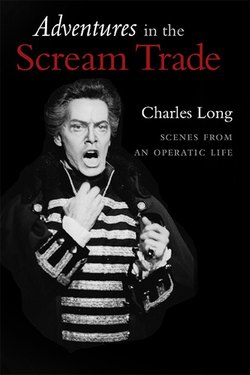Читать книгу Adventures In the Scream Trade: Scenes from an Operatic Life - Charles Long - Страница 7
На сайте Литреса книга снята с продажи.
Music School, an Experiment in Frustration
ОглавлениеMargaret Zook thought I needed more intensive guidance than she could provide, so in my senior year of high school she recommended another teacher. Every week I made a forty-mile round trip from my rural home, north of Pittsburgh, to the Shadyside part of the city and the studio of Beatrice Krebs.
Miss Krebs was an austere, zaftig woman with a dramatic demeanor—Brunhilde meets the Bride of Frankenstein. She had a shock of short black hair with outrageous white streaks that were swept back dramatically at the temples, making her appear as though she was standing in a wind tunnel. She’d made her career as an American mezzo-soprano, singing mostly in Germany and later settling into a plum teaching position at CIT.
During this period it was very difficult for home-grown singers to break into American opera companies. Around the time of World War II, many American opera houses had been seized by what was not so affectionately called the Austrian Mafia—musicians who had run from persecution in Europe. Predictably, in the snobbish American belief that “imported is better,” these men assumed the directorships—or, more appropriately, dictatorships—of a substantial number of opera companies. Once they had them, they held on for life.
Unfortunately, with many of these men came a stern conviction that opera singers could only be trained in Europe, predominantly Germany. So it was that during the 1950s through the 1970s, if you wanted to sing opera, you were expected to relocate to Deutschland and work under a three-year “fest” contract. After completing this you were welcomed back to America, having gained experience largely unavailable here. But such experience was unavailable only because American opera directors wouldn’t give singers a chance—a Catch-22.
A few years later, after I had moved to New York City, I arranged an audition with Maestro Karp, the director of Pittsburgh Opera, during a visit to my hometown. I sang, he listened, and with a touch of an accent, he said to me, “You’re good. It would be to my advantage to hire you, but I won’t. Go to Germany for a few years, and we’ll talk when you get back.”
That was it. Short and sweet. But as determined as he was to shuffle me off to Germany, I was equally determined to stay in America.
I felt like Joseph Turner in Three Days of the Condor. When it’s suggested by Joubert that Turner has too many enemies in America and he should consider living abroad, Turner responds, “I was born in the United States … I miss it when I’m away too long.”
Such were my sentiments about leaving my country. If I couldn’t have a career here, I’d rather pursue something else. Regardless of the outcome, I was going to do it my way.
But back in 1968, buried as I was in classes at CIT that had nothing to do with furthering my career, I realized too late that a conservatory would have been a better route. A well-rounded education was fine, but it wasn’t going to get me to the Metropolitan Opera. Not that I fared so well in my music classes, either. The academic environment held little appeal for me and even sparked a certain antagonism. When my curiosity was ignited, I was an insatiable learner, a fastidious self-educator. But the classroom, even the classroom of a prestigious college, felt like a prison.
I was even facing frustration in my vocal studies. Miss Krebs’s understanding of the male voice was limited. While her sopranos and mezzos fared pretty well, most of her male students languished in a purgatory somewhere between competent and disastrous. I struggled with her for three years, even bringing recordings of great male singers to my lessons. I’d play them and say, “Listen. That’s different from what you’re telling me to do. I want to do that!”
She met my goals with startling resistance, but by the beginning of my junior year, she relented. Agreeing that we had come as far as we could together, she introduced me to my second Italian influence, Lorenzo Malfatti. He was a wonderful singer with a light, fluid, Italianate sound, and he conveniently taught at a school nearby. At our first meeting I said to him, “Corelli, Warren, MacNeil, and Siepi do this ‘covered’ thing on the top, and their voices soar.”
He smiled knowingly and said, “Of course they do. Let’s begin.”
It was marvelous. Within only a few lessons he converted me from bass to baritone and helped me confirm, once again, that my instincts were correct. I learned my first baritone aria, “Per Me Giunto,” from Verdi’s Don Carlo. In less than a month my voice blossomed, and all who heard acknowledged it. I was twenty years old, and things were finally starting to fall into place.
At the same time I was working with a wonderful coach at CIT named Rudolph Fellner. Rudy was a Jewish leprechaun who never stopped smiling. He had a joie de vivre, a quick wit, and a dazzling knowledge of opera and languages. Between the influence of Malfatti and Fellner, my vocal technique and artistry grew more in six months than in the previous six years. I realized that handpicking private teachers was the way to go—apprenticeships with skilled artisans. My patience with the academic environment was growing thin—and it with me. I knew that an exit, stage right, loomed just around the corner.
